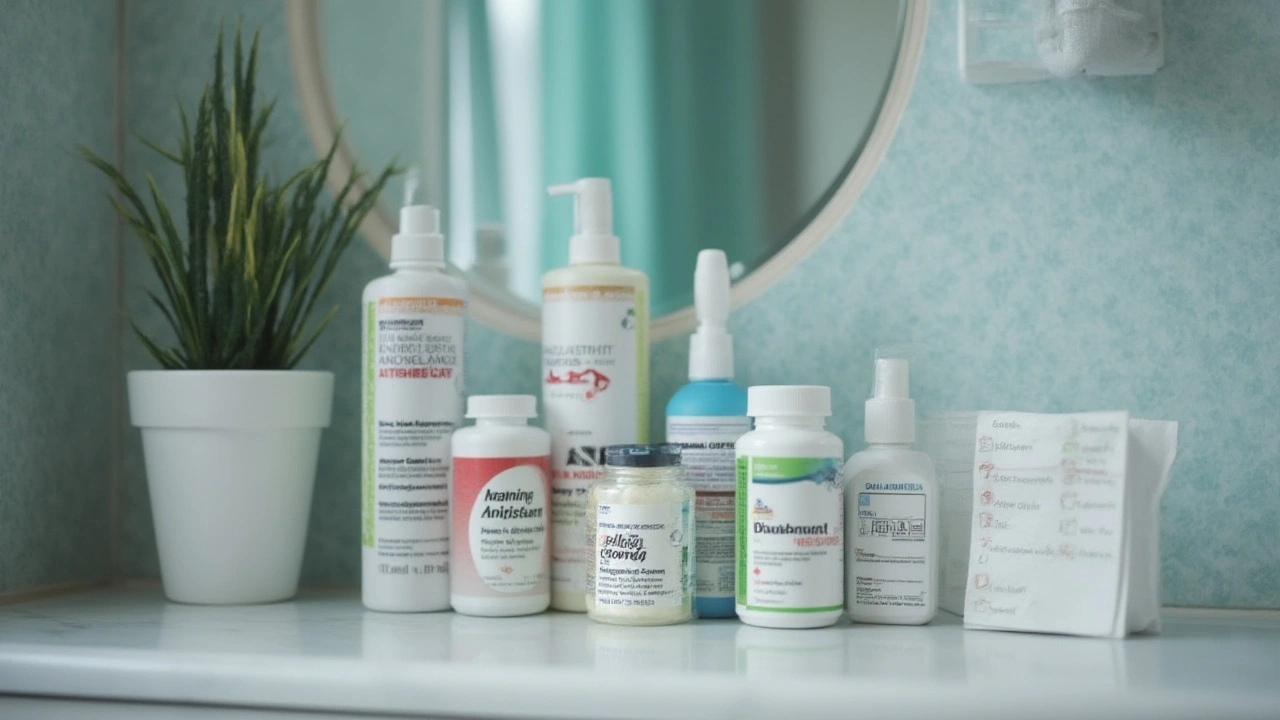If you’ve ever wondered if the pill you swallow every day is really your best option, you’re definitely not alone. Montelukast (you might know it better by the brand name Singulair) is one of the most prescribed meds for allergies and asthma. But those warnings about mood side effects and the never-ending need for a doctor’s visit just to refill? They make a lot of us want to quit. There’s good news if you’re tired of relying on montelukast alone. Some safe, simple over-the-counter (OTC) options plus a handful of lifestyle tweaks might help you breathe easier—without the stress or hassle.
Why Are People Looking for Montelukast Replacements?
So, why replace montelukast? It’s not just about the small print on the warning label. Sure, it works for lots of people—especially those with asthma, allergic rhinitis, or exercise-induced wheezing. But the not-so-secret list of side effects, from insomnia and headaches to those mood swings or more serious mental health changes flagged by the FDA, has made many pause. Let’s not even talk about insurance headaches or suddenly jacked-up prices after a routine refill.
The biggest reason? Control. Whether you’re a parent whose kid needs allergy meds or you’re just tired of scheduling yet another doctor’s visit, having alternatives means freedom. In 2025, it’s no longer rare for allergists to get the “can we go OTC instead?” question every single day. Friends swap advice in online forums. News stories have spotlighted cases of kids and adults who felt moodier after starting montelukast. That’s no urban myth – the FDA demanded a boxed warning in 2020. As of last year, around 1 in 10 prescribers surveyed said they try to avoid montelukast for mild allergies if possible. That’s a huge shift from a decade ago when it was almost the default.
The timing couldn’t be better for discussing alternatives. Pharmacies now stock a wider variety of antihistamines and nasal steroids. Evidence keeps stacking up for the right non-drug strategies too—something doctors never bothered with much before. Add to that a mountain of allergy sufferers juggling spring pollen, fall ragweed, pet dander, and city air pollution. It’s no wonder the “what else is out there?” conversations have reached a fever pitch.
Popular OTC Antihistamines: Do They Stack Up?
Let’s get one thing straight: No over-the-counter remedy fully replaces everything montelukast does. But for a lot of people whose main issue is sneezing, stuffy nose, or itchy eyes, regular antihistamines are a solid first try. The key difference is that while montelukast blocks leukotrienes (inflammatory molecules that trigger bronchial narrowing and swelling), antihistamines shut down the histamine response that makes you sneeze, itch, and get watery eyes. Sometimes, that’s enough – especially if your asthma is mild or well-controlled otherwise.
Pharmacies in 2025 carry a dizzying lineup. Here’s where it gets practical. Most doctors suggest newer non-drowsy options like cetirizine (Zyrtec), fexofenadine (Allegra), or loratadine (Claritin) rather than the older, more sedating types like diphenhydramine (Benadryl). Why? Your brain (and your work performance) will thank you. Some studies found that nearly 80% of allergy patients felt daytime performance improved with newer antihistamines compared to the old-school pills. Benadryl’s popularity used to be sky high, but now it’s mostly for emergencies or itchy rashes at home where you can take a nap.
A big trend this year: doctors recommend high-dose, “double-dosing” antihistamines for tough symptoms—but only under their supervision. That’s because research out of major allergy clinics shows that some adults and teens, on a doctor’s instruction, get 10mg cetirizine twice daily for short bursts with no severe side effects. Still, don’t try this without a green light from your prescriber.
The cheat sheet for OTC antihistamines:
- Cetirizine (Zyrtec): Kicks in within an hour, lasts 24 hours, slightly more sedating than some, reliable for most people.
- Loratadine (Claritin): Takes a little longer, very low sedation, good track record.
- Fexofenadine (Allegra): Virtually non-drowsy, a favorite for day shift workers, can be a bit pricier without insurance.
Combo allergy pills (like Allegra-D) are everywhere but know that the added decongestant can jack up blood pressure or keep you awake. If you’ve got heart issues, check with your doctor before grabbing these from the shelf.

Nasal Steroids and Sprays: More Powerful Than You Think
It almost feels like a secret—inhaling a tiny mist in the morning can do as much as a daily pill for some allergy sufferers. Nasal corticosteroids are more effective at blocking the entire allergic pathway right at the source: inside your nose. Brands like fluticasone (Flonase), triamcinolone (Nasacort), and budesonide (Rhinocort) have gone OTC in the past few years. They’re now a go-to for patients who want to ditch prescription meds or manage symptoms without systemic side effects.
What sets them apart? They actually reduce inflammation itself, not just cover up symptoms. If antihistamines are like mopping up a spill, nasal steroids fix the leaky pipe. It’s routine now for doctors to recommend a daily squirt in each nostril throughout allergy season, starting a week or two before pollen hits its peak. There’s little risk of addiction or withdrawal. Side effects? Most are mild—occasional nosebleeds, dry nose, or a slight taste of bitterness. Proper technique (head slightly forward, spray away from the center) cuts these risks way down.
Paired with an oral antihistamine, nasal steroids can help about three-quarters of seasonal allergy patients control symptoms without anything else. A 2024 review in the European Respiratory Journal showed that people who follow the technique exactly (yes, it matters) feel nearly as good as they did on montelukast for mild-to-moderate symptoms. Bonus: Nasal sprays are safe for long-term use in most adults and kids over age two.
- Tip: Nasal steroids aren’t fast-acting. You need to use them consistently for at least a week to notice the full effect – think of this as building up protection over time.
- Mixing steroids and antihistamines gives a “one-two punch” for stubborn symptoms. Your doctor can walk you through a personalized combo.
And here’s a quick table comparing common OTC options for clarity:
| Medication | Main Effect | Onset | Age Range | Main Side Effects |
|---|---|---|---|---|
| Cetirizine (Zyrtec) | Reduces sneezing, itching | 1-2 hours | 2+ | Sleepiness (rare) |
| Loratadine (Claritin) | Reduces sneezing, runny nose | 1-4 hours | 2+ | Rarely sedating |
| Fluticasone (Flonase) | Reduces nasal inflammation | 12-24 hours | 4+ | Nosebleeds |
| Budesonide (Rhinocort) | Reduces congestion, swelling | 12-24 hours | 6+ | Dryness |
If you want a deeper dive into how these stack up, there’s a guide to the most up-to-date options at montelukast OTC alternative comparisons you can check out before your next appointment. Super handy if you’re tired of sorting through brands and wish someone would just spell it out.
Lifestyle Tweaks That Pack a Punch
If you think over-the-counter meds are all there is, think again. The biggest surprise? Smart lifestyle changes can have as much impact as adding a second medication—without side effects or pharmacy runs. Here’s what allergy specialists and big hospital systems now recommend for anyone hoping to get off (or reduce) daily montelukast in 2025:
- Avoid triggers at home: Use HEPA filters. Keep windows closed during peak pollen. Wash your hair and toss clothes in the wash right after being outside. It sounds simple, but a 2023 Cleveland Clinic study found that patients who stuck to a HEPA-filter “clean room” for sleep needed 43% less allergy medicine on average.
- Shower before bed. Pollen is sticky and loves sneaking into your sheets and pillowcases.
- If you have pets, bathe them more often and keep fur out of bedrooms. Sorry, your purring cat is a major trigger factory.
- Avoid air-drying laundry outside in spring and fall unless you like the smell of pollen-infused towels.
- Do a weekly deep clean: wipe hard surfaces, vacuum with a true HEPA machine, and keep clutter down to reduce dust mite havens.
- Try saline nasal rinses: Rinse out pollen and irritants with a saline spray or neti pot once or twice a day. Studies show up to a 31% drop in nose itching and congestion for regular users compared to placebo. Just make sure to use sterile water.
- Watch air quality: Use your phone or local news to check daily pollen and pollution counts. Exercise indoors on high-count days. Some apps even send custom alerts to your phone.
- If you smoke, it’s time to quit. Allergies and asthma both get much worse with any tobacco exposure.
Another under-hyped tweak: Vitamin D. Recent Harvard-led research showed that supplementing low vitamin D levels boosted antihistamine effectiveness in people with stubborn seasonal allergies. Not a magic bullet, but worth bundling with other changes if you’re struggling.
For kids, swapping out stuffed animals, keeping toys washed, and using dust-mite covers on mattresses and pillows really helps. Schools that replaced old carpeting and improved ventilation saw a measurable drop in symptom reports, according to a landmark study in 2022. Your own home’s “mini-makeover” might be easier than you think.

How to Talk With Your Doctor About Switching
If you’re ready to ditch montelukast or just want to try stepping down your dose, start the conversation with some backup info. Be honest—bring up all your symptoms, including anything new since starting the med. Doctors are getting used to the question, and many even suggest trying modern OTC options first for mild cases anyway. You shouldn’t feel nervous about asking.
A few good questions to ask your provider:
- “Could my symptoms be controlled with just an OTC antihistamine or nasal spray?”
- “What should I watch for when stopping montelukast? Any withdrawal or flare-ups?”
- “How should I combine OTC remedies for best results? Is there a strategy for timing or dosing?”
- “Would allergy shots or another Rx work better if OTC meds aren’t enough later?”
If you notice mood shifts, weird dreams, or feel "off" while on montelukast, it’s doubly important to bring this up—no matter how mild. Some people see improvements within a few weeks of switching off, while others find they can taper off slowly using a bedtime antihistamine and nose spray plan.
You might need a little trial and error to figure out your sweet spot. Sometimes symptoms get worse for a week or two before things level off, so give your body a bit of patience. Write down a list of what helps (and what definitely doesn’t) so you and your doctor can tweak as you go.
And don’t forget—each person’s allergy story is different. The OTC route works for tons of people, but not everyone. If you have severe asthma or allergic symptoms that impact your daily life, stick close to your provider’s plan. But for those ready to take control, modern OTC antihistamines, nasal steroids, and smart daily habits offer a real shot at managing allergies with less hassle—and, often, fewer side effects.
